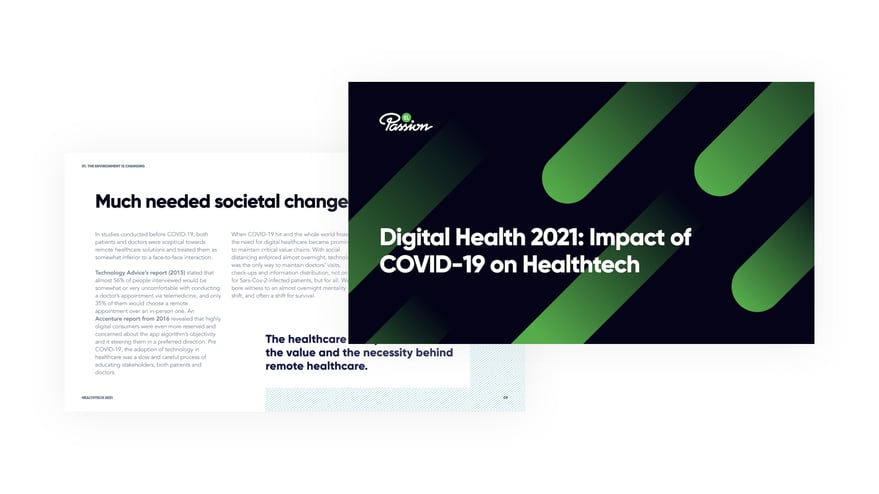11 March 2021 (updated: 18 March 2021)
Our Digital Health Trends 2021 Report Is Out - A Sneak Peek
Chapters

Our Digital Health Trends 2021 Report is out, and inside: insights from digital health industry professionals. But: why is digitalization of healthcare so important?
Growing importance of digital health in 2021
Digital health objectives are wide and diverse, from preventive care, through quicker identification of symptoms thanks to AI and data analysis, up to assisting and easing out lives of people with chronic diseases. On a high-level view, tech can help reduce expenses for patients and bring equitable healthcare for all no matter their socioeconomic status.
Digital health landscape has been growing steadily for the past few years, but the complexity and multi-dimensional character of the industry have always been its biggest constraints: cost-intensive research, complex governmental regulations, up to patients’ and doctors’ reserved approach. The pandemic made some of the biggest boundaries evaporate and accelerated an innovation effort like nothing we’ve seen before.
But as the realization of digital transformation in healthcare is finally here, healthcare itself is still a complex industry.
Companies, governments and institutions need to think long-term and cooperate in order to use digital health’s potential to the fullest.
Digitalization of some solutions on the market is the only and the most logical way through. The good outcome is that it will allow all kinds of digital companies to have a bigger or actually, a vital play in this transformation.
Cameron Carter
Manager of Health Product Plan Development @ Bright Health
Digital Health 2021 Challenges
2021 onward is packed with challenges for healthcare digitalization. One of the core issues is legislation: healthcare app reimbursement by the state, e-prescriptions regulations. Patients’ digital health records that are still fragmented, because of lack of interoperability.
The world is looking to Germany for digital health inspiration, as their digital Healthcare Act came into effect last year. The law enables government-approved digital healthcare apps to be prescribed by doctors, and then reimbursed by the state insurance.
Another big digital health challenge is interoperability. Healthcare systems across the world are deeply fragmented, and to take full advantage of digitalized healthcare we need seamless patient data exchange. It involves many stakeholders’ interests, legislatory consultation about data privacy, but the effect of it: complete digital patients’ data will drastically increase the system’s efficiency.
Digital Health 2021 Trends
One of the biggest digital health trends is data aggregation and data analysis. We have access to more data than ever. Big companies like Apple with Apple Watch, Google by purchasing Fitbit, are entering the game to gather actionable data points, but the true value of this data is not really utilized yet, presenting a great opportunity for startups building AI tools and complex data analysis solutions.
Mental health has become the unexpected silver lining of the pandemic. People are lacking outside stimuli, body movement and social interactions. This brought society’s direct focus to talk about mental health and how to cope with internal struggles, and how technology can help. We witnessed a boom of mental health apps & solutions development.
People are becoming more mindful of prevention and mental health, actively searching for guidance and consolation online. This possesses an enormous chance for technology to help monitor health and ease out the stress in a way that is approved and encouraged by healthcare systems.
Prevention has become a topic. People are becoming more health conscious, everybody is starting to realize the importance of prevention and regular checkups. The pressure is really high. For people, insurance companies, doctors.
Jonathan Ludwig
CEO & Founder @ Prevently
The change is not only visible at personal level, but also at work. Companies are actively looking for digital solutions to help employees deal with stress and anxiety.
This is just a preview of what we have in store with our Digital Health Trends 2021 Report.
Learn more about digital health challenges & trends for 2021 from the industry professionals
Get the report






